About Boots (2025) by Netflix
Boots is a North American military comedy drama released on Netflix in October 2025. It became an instant hit, as it sits among the top 10 most popular series on the streaming platform since it was released and is one of the most watched shows since July.
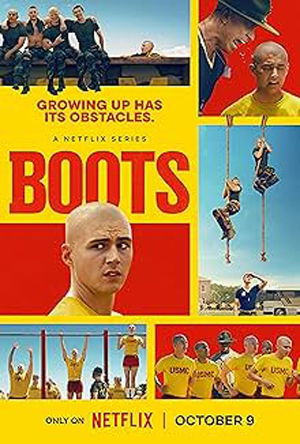
It was produced by a team of directors, including Phil Abraham, Kyle Patrick Alvarez, Silas Howard, Tanya Hamilton, and Peter Hoar. The show itself was created by Andy Parker and inspired by The Pink Marine, a memoir by Greg Cope White, a former sergeant in the U.S. Marine Corps. White himself also worked on the script.
The main cast stars Miles Heizer (Cameron Cope), Liam Oh (Ray McCaffey), Max Parker (Sargent Sullivan), and Vera Farmiga (Barbara Cope).

The plot is set in the summer of 1990 and follows Cameron Cope, a gay teen struggling with bullying who impulsively decides to enlist in the United States Marine Corps with his straight best friend, Ray McCaffey.
The story then focuses on the intense military training and self-discovery journey Cameron goes through. As it happens, he needs to hide his true identity in a strict and deeply biased environment, marked by the homophobic policies in the armed forces at the time. The whole plot is set before the Don't Ask, Don't Tell policy by Bill Clinton.
The Real Story Behind Boots: "The Pink Marine"
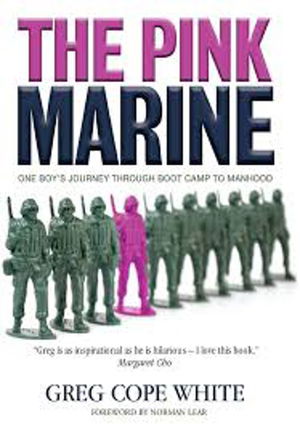
"The Pink Marine: One Boy's Journey Through Boot Camp to Manhood", released in 2015, is the real story of Greg Cope White, who inspired the entire series. It is a story about how an insecure New Orleans boy became a Navy Marine.
The show changed the name of the protagonist to Cameron Cope and the time period to 1990, just a few years before Don't Ask, Don't Tell, but it still kept the core details of Greg's story.
And this story starts when Greg decides to suddenly go through the strict Parris Island military training. He did it to follow his best friend, Ray. Greg was skinny, out of shape, and, most importantly, gay, so he wasn't actually allowed to enlist in the armed forces at the time. He did serve from 1979 to 1985, however.

During the intense and challenging training, Greg learned that the military system, despite being relatively inhumane, had the power to make all people equal. The whole process stripped recruits of their old identities and pushed them to the edge. However, it also exposed how everyone, deep down, had their own struggles and insecurities.
Years later, now living as a scriptwriter and TV producer, Greg turned his experience into a book. His intentions were clear: deliver a message of strength and hope to young teens struggling with bullying and prejudice. He also worked on the Netflix adaptation as a writer and executive producer to make sure the show ended up faithful to his thrilling experience.
About Don't Ask, Don't Tell
The DADT policy was a federal law implemented by the Bill Clinton administration in 1994, after officials started to argue, quite intensively, if openly gay people should be allowed to serve in the military.

Before DADT, gay people could not enlist in the military under any circumstances. Bill Clinton's 1993 policy, which aimed to change that, was strongly opposed by the current leaders of Congress and the military forces. DADT was a compromise: instead of barring gay people from serving completely, it proposed mandatory discretion.
The goal was to keep the current policy, which forbade gay people from taking part in the armed forces, but also make military "witch hunts" harder. Overall, it resulted in around 13,500 able military personnel (soldiers, marines, and Navy SEALs) being removed from the forces solely because of their sexual orientation and forced many others to live double lives.
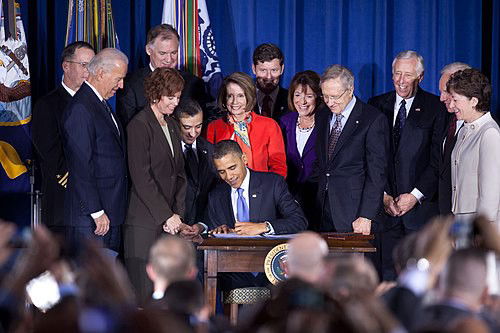
The DADT policy faced strong, rising opposition throughout the years, as it was considered biased and prejudicial to national security. Because of it, the military often couldn't get the talent it needed, and it also promoted an environment filled with lies and fear.
President Barack Obama eventually repealed the DADT policy in December 2010, but this didn't take effect immediately. It officially came to an end in September 2011, and from then on gay people, lesbians, and bisexuals could openly serve in the U.S. armed forces for the first time in history.

How Much Prejudice and Homophobia Affect the Armed Forces
In many countries, prejudice and bias affect the armed forces as much as the culture around virility and invisibility does. Military spaces have been historically built on an ideal of masculine virility, which ties strength and skill to heteronormative behavior.
Everything outside this standard, including homosexuality and nonbinary gender identity, is often seen as a weakness or a threat to cohesion and discipline.
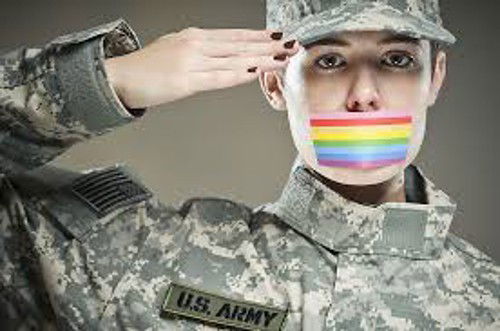
This creates a hierarchy around invisibility, in which LGBTQIAPN+ military personnel feel compelled to hide their identity and conform to the cultural rules and standards of the troops. They have to publicly deny who they are.
Prejudice doesn't only encourage officials to bar openly or closeted LGBTQIAPN+ people from serving in military forces (a restriction that has also been abolished in many countries), but also manifests itself in other ways:
Harassment and Discrimination: Jokes, insults, verbal violence, and, in severe cases, physical violence are still part of military institutions today.
Career Obstacles: LGBTQIAPN+ people may struggle to advance professionally, be seen as "unable" to perform certain roles, or have their skills questioned because of their identity.
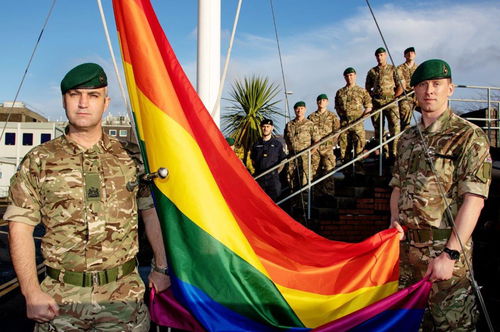
Veiled Persecution: Some military members apply the rules more strictly to those who are or are seen as part of the LGBTQIAPN+.
Controversial Laws: Though some countries have made efforts to prevent direct discrimination, in some military codes we can still find terms like "pederasty" (and, historically, these terms have been used to persecute queer people). We definitely still have a long way to go if we want to eradicate homophobia from our institutions for good.
Some institutions still resist change and hesitate to embrace modernity, that is, to recognize sexual orientation and gender identity have no say in what makes someone fit for the military. It also doesn't make them any less worthy of respect or dignity.
Review

Boots is not just another military tale about overcoming physical challenges, and that's what made me love it. It used the strict setting of 90s Navy training, under the shadow of "Don't Ask, Don't Tell", as an incredibly powerful stage to discuss what it feels like to grow up as a queer person, still looking for your place in the world.
It also employs the right amount of sensibility and humor to tackle such a taboo theme: homophobia and other types of prejudice (racism, xenophobia) in an environment that demands absolute conformity to one standard. It is a gut punch that actually carries a nice dose of humanity.
I constantly feared for the protagonist. The risk of being exposed, expelled, or retaliated against creates constant tension and drama. As viewers, we can immediately feel his fear.
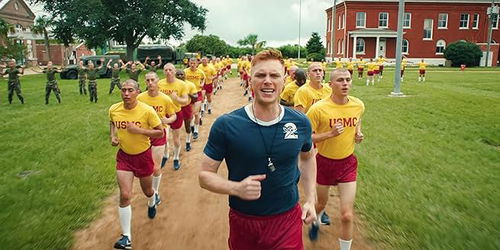
The show itself shows how recruits can become friends and find unexpected camaraderie with each other. It is a powerful reminder that acceptance can come from where you least expect it and that, deep down, everyone has their own weaknesses and secrets.
Because it's the 90s, a very repressed chapter in queer history, the price of living a double life is obvious. The scariest part is realizing that these prejudiced views still echo today and actually make Boots a powerful commentary on how homophobia is a persistent danger.

The incredible performance by Miles Heizer and the un-clichéd characters make this series more than just one single message: it is a lesson on boldness, on making friends, and on how everyone just wants to be accepted. In the end, it shows that the hardest battle is, actually, accepting yourself and resisting day after day without saying anything.
Critics Review
The show got mostly positive reviews and has been a success.
Rotten Tomatoes: It earned 89% with critics and 91% with overall audiences.
IMDb: It earned a 7.9/10 rating in over 13,000 reviews.
Reasons to Watch
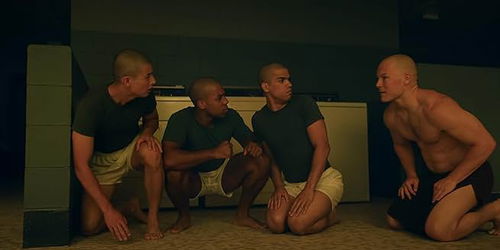
This show covers many themes, like how stressful and tough military training is, but it uses this, for instance, to show how hiding who you truly are is painful and costly.
It masterfully combined dramatic moments with intelligent humor. As it touches on prejudice and the exaggerated, toxic masculine ideals of the time, it keeps us glued to the screen. It is also quite fun, which makes the social commentary it is trying to make easier to understand and even more powerful.
If you're looking for something fun, thrilling, historically relevant, and that still makes you reflect on what courage and identity mean in a world that demands conformity, Boots is a great choice.
Thank you for reading, and see you next time!










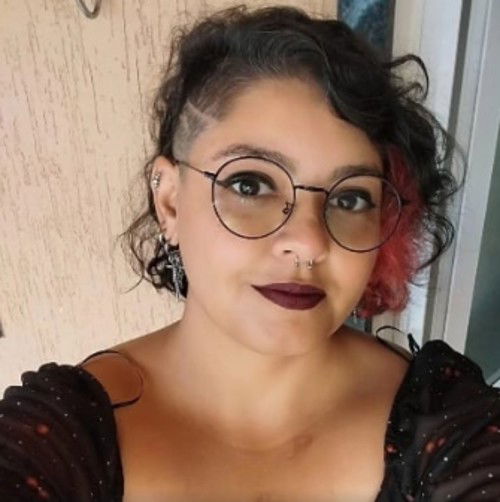

— Comments 0
, Reactions 1
Be the first to comment